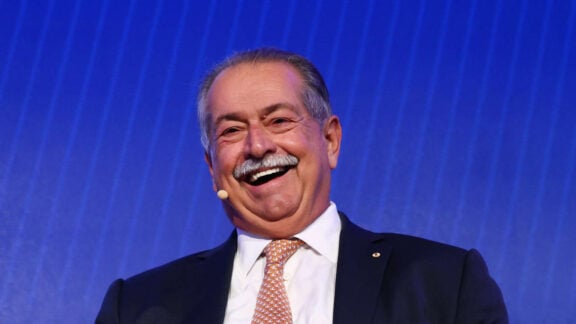Few people have been more out-rightly despised in Greece than Wolfgang Schäuble.
The outgoing German Finance Minister has been considered as the person responsible for the harsh austerity measures that have suffocated the Greek economy and led thousands of people to unemployment and despair.
“Obviously in Greece I was a bogeyman, or at least for some media”, he said, in an interview to SKAI television.
He got that right.
It is unclear if Dr Schäuble reads Greek political cartoons, but if he did, he would find that he’s regularly depicted as a Nazi general. In one of his most controversial cartoons, the late great Yannis Kalaitzis depicted him spewing commands in German, while holding a giant dildo. Another cartoonist, Tassos Anastasiou, had shown him saying, in regards with the (now infamously failed) negociations: “We insist on making soap out of your fat, we can discuss about the fertilizer made from your ashes”.
Now that he’s getting out of the picture, as he’s about to undertake the role of the Speaker of the German Parliament, one cannot but feel that there is an ‘end of an era’ sentiment in the air, with undertones of what CP Kavafy had described in his poem Waiting for the Barbarians: “Now what’s going to happen to us without barbarians? Those people were a kind of solution.”
What is going to happen to Greece, without the current narrative’s ‘bogeyman’?
But was he an enemy of Greece, as his critics insist, painting him as a criminal, someone who destroyed a country, making it lose 25 per cent of its GDP, creating hordes of unemployed and poor, only to save his own country’s failed banks?
Not really. To say that his actions were hostile to Greece would be an exaggeration.
Wolfgang Schäuble was not anti-Greek. He was pro-German. He acted to protect the interests of his country (and his country’s banking system), while insisting that he worked for the good of the European Union.
If he’s to be blamed about something, it is for perpetuating the myth of the ‘lazy Greeks’, who live beyond their means at the expense of German taxpayers.
Also, for steering the EU ship, without holding an official role in it.
Many people still believe that the German finance minister was leading the Eurogroup, informal meetings of the finance ministers of the Eurozone.
He did not. He was one of the many finance ministers taking part in it, his voice and vote technically being equal to the others.
In effect, he was leading it, as the person responsible for the eurozone’s most powerful economy.
The actual Eurogroup head, Jeroen Dijsselbloem, recently stepped in to clarify misunderstandings, regarding the most powerful FinMin in the group: “Wolfgang Schäuble is not for or against Greece. He believes in Europe,” he recently said in an interview with the Athens newspaper Kathimerini. “That’s why he always sets such great store in implementing agreements.”
Schäuble himself, in his way out from the finance ministry, is also trying to clarify things, giving one interview after another, in an attempt to defend his legacy, and mainly, his stance against Greece, insisting he was right.
In his interview with SKAI, he once again used an admonishing tone towards the debt-wracked country, suggesting Greece should stop blaming others for its financial woes and stick to a reform agenda instead of relying on debt relief.
“When you ask others for loans, you cannot insult them for granting the loans. It doesn’t make sense. Greece’s problems are Greece’s problems,” he said.
In another interview, to the Sunday edition of Frankfurter Allgemeine Zeitung, he had some praise to offer, saying the country is on a “good path” and that it will soon re-acquire the ability to seek credit from capital markets. “That’s why any discussion over whether or not Grexit would be better doesn’t help at all in the present,” he added.
Asked if the eurozone crisis is over, he laconically said “I hope so”.
If it is, it will not be thanks to him. Wolfgang Schäuble was representing EU’s largest economy during the GFC and the Eurozone crisis and he was the strongest advocate of austerity as a means to tackle the crisis.
In his tenure, his actions may have benefited his country, but it is doubtful that Europe is better off now, as a whole.
The whole system’s submission to his will, in a way, is the proof of the problematic nature of the EU. For many years, pro-Europe advocates have been campaigning for the EU to become a political union, a kind of federal state, with leaders elected by the people and an executive branch accountable to the people. It now has a president and a foreign minister, but the most important part is lacking: the financial one; a common European Finance Ministry, that would set a common EU policy, so that Germany would not have to believe that it is ‘bailing out Greece’, but that they are both part of the same european economy.
The irony, of course is that, had a position of European Finance Minster been created, who would hold it, but Wolfgang Shäuble?
That man was a kind of solution.








